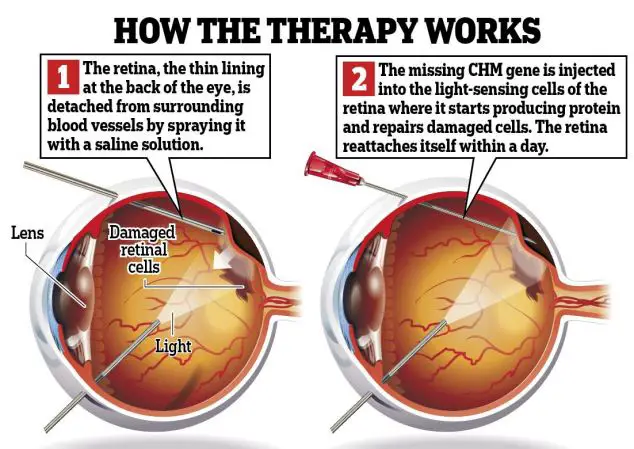Age-related Macular Degeneration (AGM) is one of the leading causes of vision loss. Due to a whole host of faulty genes, AGM was thought to have no viable treatment. That is until now. A report published today in The Lancet suggests that we may be closer to a treatment for Macular Degeneration than we originally thought.
Robert MacLaren from the University of Oxford and his colleagues reported that they have effectively employed gene therapy to treat the rare eye disease, Choroideremia.
Choroidemeria affects one out of every 50,000 people, and though less common than Macular Degeneration, is another degenerative eye disease that causes individuals to go blind. The disease is caused by a defect in the CHM gene that prevents the body from producing a much needed protein called REP-1. Without REP-1 cells in the retina deteriorate and eventually die off leading to blindness.
The trial involved six patients who each contained a different stage of the disease. Each patient received an injection carrying a virus containing the corrective copy of the CHM gene into one of their retinas. The other eye was left alone to be used later for comparison.
Two male patients saw significant improvement to their impaired eyesight, while the four others appeared to have stabilized their vision.
This gene therapy is not to be confused with stem-cell therapy in that it cannot replace cells already dead. The gene therapy can only help to heal already sick cells and prevent healthy ones from deteriorating.
Further studies will need to be conducted to see the effect this sort of gene therapy treatment has on the patients. In the past, while gene therapy worked to cure one ailment, it led to others and even death down the line. Not to mention, it is still too soon to see how long the treatment will last.
James Bainbridge from the Institute of Ophthalmology at University College London explains that “given the relatively slow degeneration in this condition, longer-term studies will be required.”
The implications of this study are remarkable and could lead to break-throughs in the more common and complex cause of blindness—Macular Degeneration.











